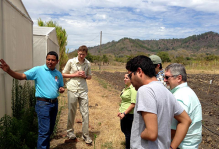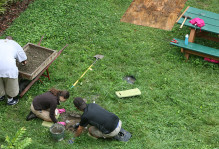Paraiso, Villa Mella, Dominican Republic, part 3
We were scolded today. It was inevitable. A middle-aged male resident, obviously in pain and a little inebriated, wanted aspirin. We explained that we are researchers rather than “medicos,” working to understand the community in order to reduce the causes of chronic illness. He wanted aspirin – now, and no conceptual explanation would make his head feel better. It is surprising only that we have not encountered this criticism earlier in our four years of work. It is part of the tension: relief work versus capacity building. It’s not a simple choice, the immediate or the sustained. John Pothen is troubled especially and wants to make the man feel better, to explain so that he can understand and feel less bitter. But there is little chance that any words can fix the problem, win over this detractor. It would be uncharacteristic of the project to believe simply that we’re right and that with the opportunity, we could convert this critic. There is no simple “right” here.
We close the clinic at noon today. The medications are nearly exhausted and all but the students are as well. Some of the team will return to Esfuerzo for lunch at the home of one of our dear friends. Some will return to Santo Domingo for a well-deserved “vacation.” And, some of us will travel to Hatian bateyes – settlements of Hatian sugar cane workers. Except for the complete lack of health care, conditions are not worse here than in Paraiso, but here government policy ensures the perpetuation of marginality and despair.
By evening we are all back in Santo Domingo. All but a few enjoy a last meal of Cubano and Dominicano sandwiches at a small diner on Calle El Conde and then back to the plaza for one last evening of fresh breezes and warm friendships. There’s an outdoor concert. We join the fun – including two of our number dancing on stage to the enthusiastic enjoyment of the entire crowd. It is bittersweet, and we share our thoughts, feelings, and hopes openly, unguardedly among fellow travelers. There are spontaneous renditions of “Hark Upon the Gale,” and sappy versions of pop tunes from the past. There is a chorus line performance to an upbeat song belted out by our professional entertainers, and there is Brugal. But mostly, there are verbal and non-verbal expressions of community, belief in collective action, commitment to lives well-lived, and a sense of hope for the future.



No comments.
Comments are currently closed. Comments are closed on all posts older than one year, and for those in our archive.